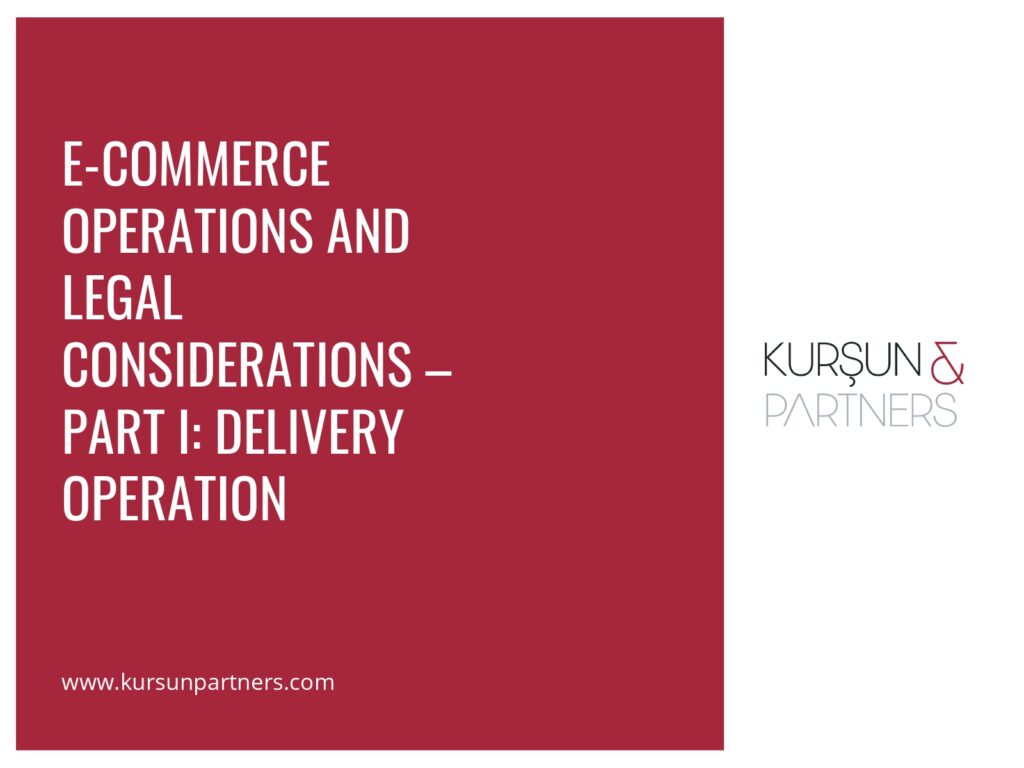E-commerce has undeniably emerged as the dominant force in today’s commercial landscape, surpassing traditional commerce models. Consequently, there has been a remarkable surge in the number of e-commerce ventures in Turkey. While entrepreneurs often view e-commerce as a simpler alternative to traditional trade, where they can swiftly establish their online presence through website design alone, this perception overlooks the essential intricacies involved. The success of an e-commerce business hinges on meticulous preparation and attention to critical details.

With this series of articles, we will delve into the practical applications of e-commerce operations and the legal aspects that are present in website details. Our first article will focus on the processes of “delivery.”
Delivery Operation
a. 30-day period
In accordance with the Turkish Regulation on Distance Contracts, orders placed through e-commerce channels must be delivered within 30 days, except for custom-made products based on the consumer’s personal request or need. If orders are not delivered within this timeframe, consumers have the right to terminate the contract and receive a refund for the paid amount.
Successful e-commerce operations depend on managing the order-to-delivery process efficiently and swiftly. However, the 30-day delivery period mandated by the Regulation on Distance Contracts poses a significant risk for sellers, particularly for non-stocked products. If the consumer decides to cancel the order due to non-delivery within the stipulated timeframe, the seller may incur losses in production costs since the product has been produced but not sold.
Therefore, the delivery time of the products, how these periods are communicated to customers on the website, which products will be stocked, and stock control throughout the process are critical steps in e-commerce operations. These steps can help mitigate the risks associated with the 30-day delivery period and ensure a successful e-commerce business.
b. Carrier Company (Cargo/Transportation Agreement)
Carrier’s Delivery Time: While the production process is crucial in the delivery operation, there are instances where the 30-day delivery period is exceeded due to irregularities caused by the carrier company. It is important to obtain references regarding the carrier company’s delivery times and verify if the Transportation Agreement includes any commitments regarding delivery times.
Carrier’s Product Acceptance Conditions (Packaging): The product acceptance conditions specified in the Transportation Agreements of the carrier company should be carefully assessed. It is particularly important to evaluate packaging requirements and consider any negligence clauses that the carrier company may include to evade responsibility, depending on the packaging method.
Transportation Fees: Carrier companies have varying transportation fees based on the delivery distance and product weight. Therefore, conducting a cost analysis by obtaining price quotations from different companies, considering the weight of the products to be sold, is recommended. It is also crucial to determine whether these costs will be passed on to the consumer during the sales process. While many e-commerce companies have implemented “free shipping” practices to distinguish themselves, including all charges in the transportation agreement is necessary to avoid unexpected costs.
c- Delivery Method (Transportation Agreements)
To minimize costs, it can be more advantageous for certain products to be delivered directly by the seller using their own vehicles or through contracted transportation companies, rather than relying on well-known courier companies. Apart from cost benefits, there are cases, particularly in the luxury segment, where it may be necessary for the seller to handle the delivery themselves to ensure product safety and eliminate the risk of faulty sales. Additionally, for sales that involve assembly, e-commerce sellers need full control over the delivery process. In situations where direct manual delivery is not feasible and the use of specialized transportation equipment like elevators or cranes is required, local transportation companies can offer more cost-effective solutions compared to larger courier companies.
In such scenarios, sellers have the option to handle the delivery operation personally by establishing their own organization or choose to collaborate with local transportation companies. The key elements to be determined in the “Transportation Agreements” to be signed with transportation companies can be summarized as follows:
- Representation and warranty of necessary permits and licenses held by the transportation company.
- Management of the delivery operation process, including delivery dates, routes, packaging, delivering products to the carrier, transportation tools like pallets, cases, boxes, customer delivery conditions such as delivery receipts, etc.
- Transition of responsibility for product damage and loss to the carrier
- Procedures for cases of non-delivery
- Management of dispatch notes and record-keeping requirements
- Vehicle and personnel qualifications, vehicle advertising, and personnel attire
- Recourse relationship regarding occupational health and safety and labor claims (According to the precedents of the Court of Cassation of Turkey, if transportation company employees are exclusively assigned to and work in the production areas of a specific company, they are considered subcontractors of the e-commerce company. In such cases, the e-commerce company becomes directly responsible for the payment of all rights of the transportation company’s employees.)
- Operation management in compliance with the Personal Data Protection Law
- Service fees and revenue commitments
- Letter of guarantee
These considerations play a crucial role in ensuring efficient and well-regulated delivery operations in e-commerce businesses.
In this article, we have discussed the operational processes related to delivery in e-commerce that are of legal significance. In the next article, we will delve into consumers’ rights of withdrawal and returns.
